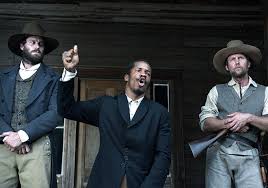Nate Parker’s directorial debut, Birth of a Nation, garnered rapturous acclaim throughout this year’s Sundance Film Festival, and Parker rode this riptide of reaction toward the festival’s top two prizes. During the Sundance Film Festival awards ceremony on Saturday night, Birth of a Nation pulled off a double victory by sweeping the festival’s two most prestigious awards: the U.S. Dramatic Grand Jury Prize and the U.S. Dramatic Audience Award.
“Thank you Lord, thank you Sundance,” Parker exclaimed during his acceptance speech. “I’ve seen first-hand that people are open to the idea of change, and the fact that this is happening means everything to me.”
The accolades continue to roll in unabated for the Nat Turner rebellion drama. Its world premiere drew an impassioned response and standing ovation from the audience, and it sparked the greatest bidding war in the festival’s history, setting a new Sundance record for a rights sell at $17.5 million to Fox Searchlight.
Before the premiere, Parker sat down with The Hollywood Reporter and discussed the turbulent seven-year sojourn to make Birth of a Nation. Despite a fellowship through Sundance, he still heard the usual reasons a Black film would not succeed: movies with Black leads do not play well on an international stage; it would be too expensive to re-stage fight scenes for a period film; it was graphic; too violent; there was no big box-office draw; and Turner was too divisive of a historical figure to serve as a basis for an entire film.
Parker was not deterred. Investing $100,000 of his own money, he crisscrossed the country to find financial support. With investors, including current NBA player and San Antonio Spurs point guard Tony Parker and former NBA player Michael Finley, Nate Parker raised $10 million and shot the film last May in Georgia.
With the ongoing inferno of debate over diversity raging through Hollywood, Birth of a Nation’s Sundance success represents a significant development for Black cinema as the new year begins. It also represents the first leg in a greater mission: getting this film seen by general audiences.
“Making films is a very, very difficult thing and often you’re left on your own wondering why you’re doing what you’re doing,” Parker continued during his acceptance speech. “Thank you, Sundance, for creating a platform for us to grow, in spite of what the rest of Hollywood is doing.”



